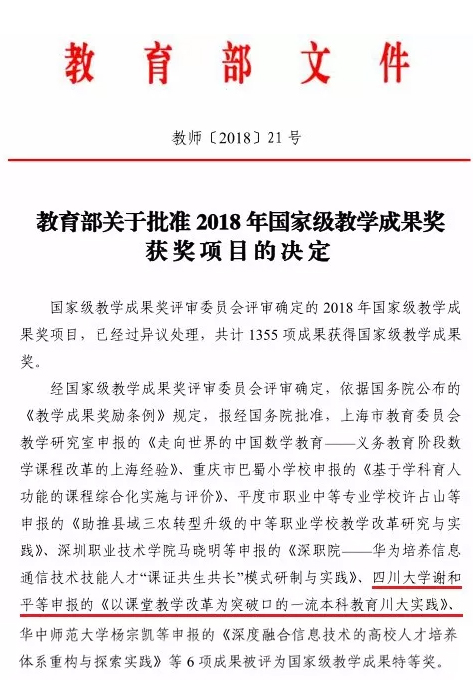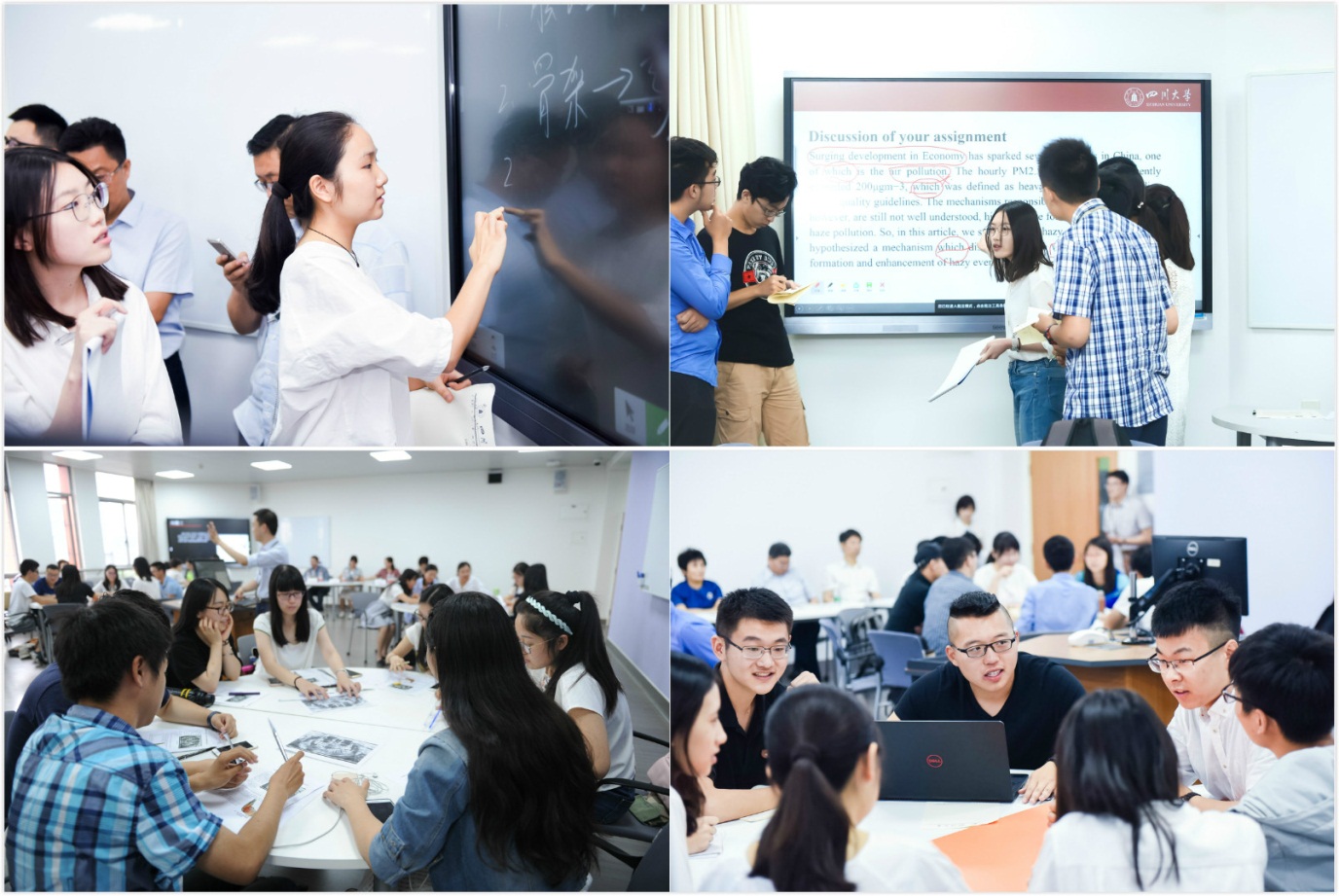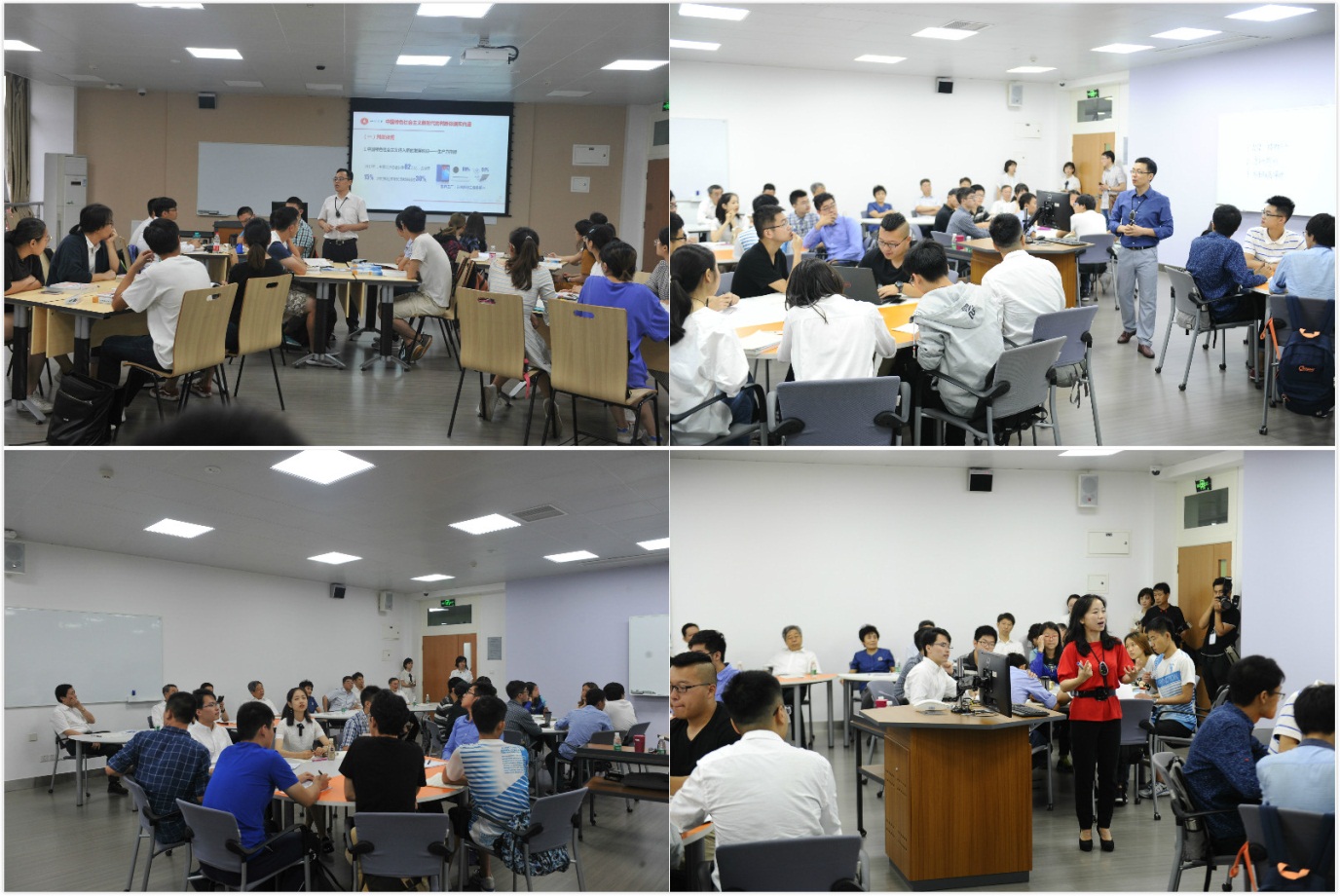On December 27th, the Ministry of Education publicized the “Approval of winners of 2018 National Teaching Achievement Prize”. Sichuan University has won six national awards for teaching achievements in higher education, including one special award and one second-prize for independent achievements at SCU, two first-prize achievements and two second-prize achievements in cooperation with sister universities.
Being a project led by Professor Heping Xie, an academician of Chinese Academy of Sciences, “The SCU teaching practice of first-class undergraduate education centering on classroom teaching reform” has won the Special Award of National Teaching Achievement Prize. This is the first special award that a university in Sichuan Province has ever obtained since 1997 when the National Teaching Achievement Prize changed its award plans. This award indicates that SCU has become a leader in the reform of classroom teaching, and got recognized by the higher education community.

The selection of National Teaching Achievement Prize is conducted once every four years. Being classified into three major categories of basic education, vocational education and higher education. It has two special awards, 50 first prizes and 400 second prizes. The National Teaching Achievement Prize represents the highest-level teaching work in China’s higher education. It is the core indicator of teaching reform and innovation in cultivating talents in universities and colleges, and the higher education community attaches great importance to the prize.
Sichuan University has always adhered to the principle that the training of first-class talents is at the core of building a first-class university, and the key is to have a first-class undergraduate education. Over the past ten years, SCU has devoted its efforts to the construction of the best undergraduate school, turning out remarkable results in personnel training and fruitful achievements in educational and teaching reform.
Attached is a detailed introduction of the special award
The SCU teaching practice of first-class undergraduate education centering on classroom teaching reform
Sichuan University is among the first universities to construct the “double first-class” status. With educating the students as its foundation, SCU implements elite education, individualized education and all-round development education, doing its utmost to provide the best undergraduate courses. Over the past decade, SCU has carried out first-class undergraduate education practice with classroom teaching reform as a breakthrough point.
Reform of Classroom Teaching and Performance Evaluation; “Inquiry – Small Class” promotes classroom revolution.

After years of teaching research and exploration, the university has gradually delineated a classroom teaching concept centering on the effectiveness of students' learning. Since 2010, the university has carried out the "inquiry-small class" classroom teaching reform, grasping the two key links of "classroom" and "examination". The reform comprehensively implements heuristic teaching, teacher-student interaction, inquisitive discussion, on-going academic performance evaluation and non-standardized examination in order to promote profound changes in undergraduate education and teaching.
Reform of classroom teaching compels the students to take initiative.
SCU has adopted a class size of 25 students since 2010. College English class was the first to use this small class format. As far as those classes are concerned, which cannot use this small class format within a short period of time, the teachers then adopt a “mid-size class teaching with small group discussions” format. College Mathematics is one of the subjects using this teaching format. In 2012, SCU established a system of training, selecting and managing graduate teaching assistants, and assigned graduate teaching assistants to facilitate teachers in "inquiry-small class" teaching of courses such as common basic courses, fundamental subject courses and core courses. During the 2017 – 2018 academic year, for example, SCU trained and hired 2,664 graduate students to assist students with lesson previews, in-class discussions and questions after class in 3,410 courses.
Since 2013, SCU has required individual colleges/schools to implement “inquiry-small class” teaching as an objective of the year. Heuristic teaching, teacher-student interaction, inquisitive discussion have become the mainstream teaching style. Integrated teaching (a way to employ advantages of both online and traditional teaching methods), flipped classroom, PBL, TBL have accelerated the teaching reform to a new level. As of right now, there are 9,024 courses utilizing the “inquiry-small class” teaching, which account for 70.5% of all courses.
“On-going performance evaluation-non standardized exams” reinforces teaching results.
SCU set up the “project to reform exams in undergraduate classes”, starting the test-run of exam reform in 2011. Approximately 400 courses had taken part in three test-runs by 2013. Starting from 2014, SCU has listed exam reform as a task of the year for colleges and schools to complete. More academic subjects were included and more teachers got involved. In 2017, SCU basically enforced “on-going performance evaluation-non standard answer exams” in all subjects, substantially boosting the overall quality of teaching and steady progress in students learning.
The on-going performance evaluation has changed the situation whereby “A student’s grade depends totally on a final exam”. Exams without standard answers stimulated “students’ critical thinking skill”. In 2015, SCU selected 25 courses as winners of the Distinguished Contribution Award of exam reform. In 2016, SCU had an open competition and selected 39 non-standardized exams as winners of Outstanding Exam Award. SCU then incorporated these outstanding exams along with students’ answers into Sichuan University Non Standardized Exams and Answer Keys, arousing strong response among universities in China. In 2017, SCU published Reform Students’ Performance Evaluation to stimulate creative thinking --- 2017 Sichuan University Non Standardized Exam Papers and Exams. In 2018, the university published Tap into creative potentials and reconstruct reference of framework--- Sichuan University Outstanding Non Standardized Exam Answers, contributing to the national exam reform and talent training with an “SCU wisdom”.
Generous rewards and the development of teachers’ teaching ability have greatly improved reform and innovation of education and teaching.

The teaching reward system has spurred on the intrinsic motivation within teachers to educate people and teach subjects. A stimulus system consists of bounty rewards and honor, such as “Distinguished Teaching Prize”, “Sparkling Alumni Teaching Reward” and “Five-Grain Liquor Outstanding Teaching Prize for Youth Teachers”, etc. The “Distinguished Teaching Prize” started in 2014 with a prize money of one million RMB for a special prize, 500,000RMB for a first prize, 300,000RMB for a second prize and 100,000 RMB for a third prize. Being launched in 2015, the “Sparkling Alumni Teaching Reward” provides 300,000RMB for a first prize, 100,000RMB for a second prize. The “Five-Grain Liquor Outstanding Teaching Prize for Youth Teachers”, also launched in 2015, provides 50,000RMB for each winner. By generously rewarding class teaching teachers who have high moral standards, excellent teaching skills and academic achievements, SCU shows its total recognition and veneration for outstanding teachers teaching undergraduate students for their hard work. Over the past four years, the prize fund has reached more than 80 million yuan, rewarding more than 5,000 people. The front-line teachers have got a strong sense of honor and fulfillment.
Teacher development promotes teachers' teaching innovation incessantly. Given the practical needs of teaching reform and innovation at the forefront, the SCU State-Level Teacher Development Demonstration Center fulfills the needs of different groups of teachers with various backgrounds. By virtue of various seminars on different subjects such as "International Seminar on Learning-centered Education" and "Innovation Hall for Undergraduate Education", and compiling and distributing a series of atlases of "Teaching Dynamics of Universities in the World", the center has strengthened the links and cooperation among colleges. Consequently, the center has helped to establish a teaching community combining the virtual and the real both online and offline, reinforcing the communication and cooperation between teachers in teaching, scientific research and academia.
Integration of upgraded software and hardware and smart teaching environment provide powerful support for the reform and innovation of education and teaching.
Starting from 2012, SCU has launched the “construction of smart teaching environment” and renovated 510 classrooms successively. So far, SCU has invested 200 million yuan to build 403 smart classrooms of various kinds, which account for 80% of all the classrooms. The different types of smart classrooms include mobile phone interactive classroom, multi-screen interactive classroom, network interactive classroom, multi-window classroom and so on. SCU has also redesigned the empty and monotonous public space in the teaching building, creating more than 5,000 square meters of interaction-oriented communication space so that teachers and students can have discussions and exchange ideas anytime and anywhere.
From June 20th to 22nd 2018, the "National Conference on Undergraduate Education in New Era" of the Ministry of Education was held in Sichuan University. The national higher education community comprehensively investigated SCU’s "inquiry-small class" teaching reform and innovation based on the smart teaching environment. Nearly 400 people inspected the SCU smart teaching environment and West China medicine education, and observed 46 “inquiry-small class” demonstration classes. Among the visitors were Minister of Education Baoshen Chen, Vice Minister Huiqing Lin in charge of higher education, university administrators, provincial ministers of education from various provinces and cities and journalists from over 30 newspapers such as People’s Daily, CCTV, Xinhua Net, Guangming Daily, and China Education Newspaper, etc. Minister Chen stated: "We have visited the smart classroom of Sichuan University, and observed the "inquiry-small class" demonstration classes. Teachers and students have vibrant interaction in searching for real knowledge online and offline. Coupled with a frequent conversion between the virtual and the real, students use both their hands and brains to practice their skills. They have exhibited a different kind of class. We are very touched." Counterparts from all over the country have come to visit and investigate, highly complimenting SCU.
Innovation and entrepreneurship education goes on through the whole process, producing remarkable results in all courses
All SCU students receive the innovation and entrepreneurship education and 80% of the students participate in innovation and entrepreneurship practice of various kinds. SCU endeavors to enable 5% of the students to make achievements in terms of innovation and entrepreneurship. SCU was approved to become a pilot of “entrepreneurship and innovation” project in 2016, and became one of the first model universities of deepening innovation and entrepreneurship education in China in 2017. SCU has won a total of seven gold medals, three silver medals and one bronze in three consecutive China College Students “Internet Plus” Innovation and Entrepreneurship Competitions, ranking second in all Chinese universities in terms of the number of gold medals. In the meantime, SCU has built, around the campus, the "youth (college students) entrepreneurship park of Sichuan University Technology Zone in Wuhou District”, and initiated the "local area + university + technology zone" mode, attracting 55 entrepreneurship teams of college students to settle in. 48 of the 55 teams have registered as a company doing business, an incubation success rate of 87%. The total output value of College Students' enterprises is 128.863 million yuan, and innovative college students’ enterprises such as Leleyun, Miracle Wormhole Science and Technology have come into existence.
